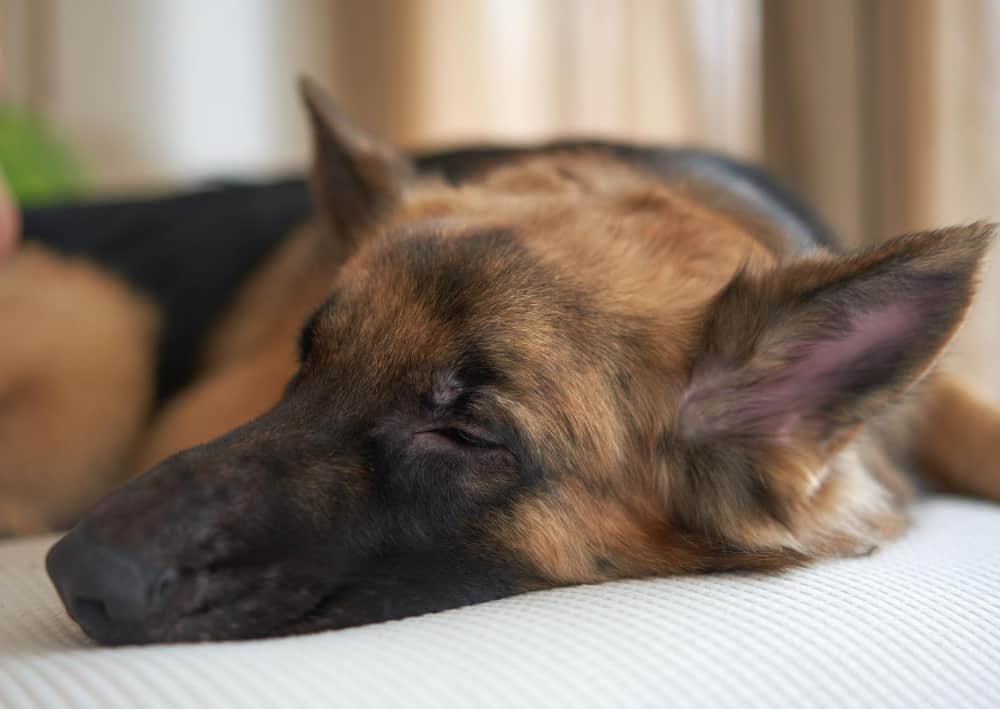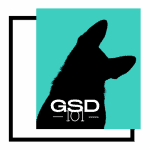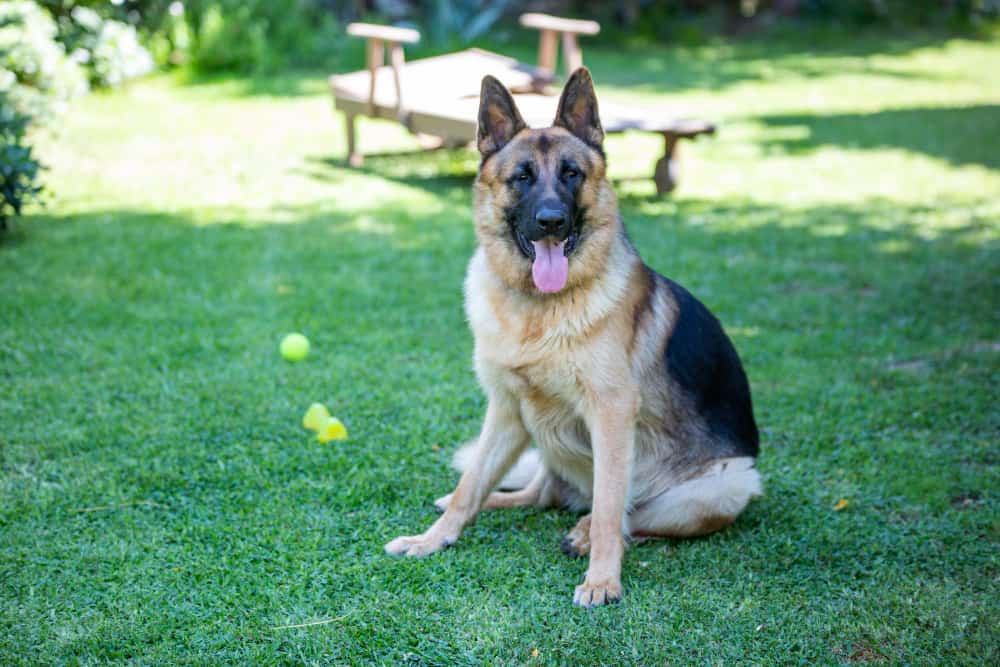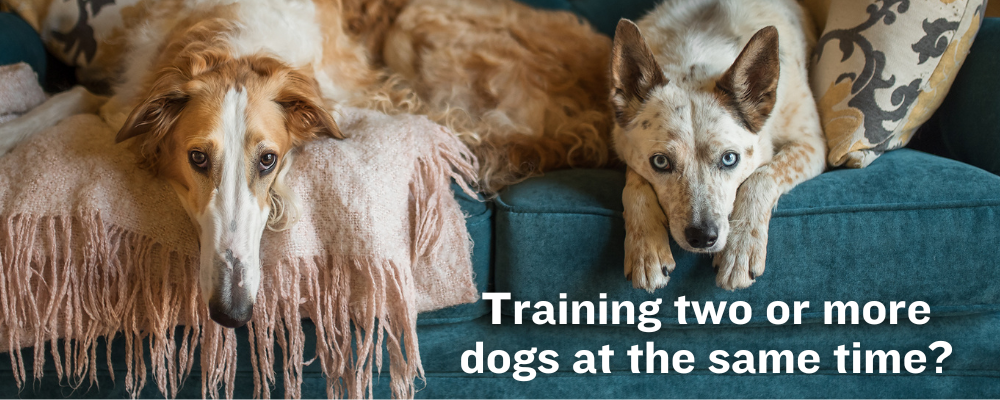Does your German Shepherd seem to be excessively itchy in the spring? Or maybe they suddenly have stomach problems with the food they used to love. You might have a German Shepherd with allergies. If you are worried your dog has allergies or just want to learn more, then this is the article for you.
German Shepherd dogs can develop different allergies for no reason. They can have a food-based allergy to specific proteins, grains, and even dairy products. Parasites can be very bad and could cause an allergic reaction too. There are also environmental and household situations to look out for when considering what your dog is allergic to.
We will be addressing what the most common allergies are for GSDs. Also, how you can avoid or alleviate potential allergies. Owners also share their thoughts on what to look for and how to help.
Four types of the most common allergies in German Shepherds
As a whole, the German Shepherd breed is not highly susceptible to allergies. With that being said, though, they are a possibility. The most common allergies your German Shepherd could experience will usually fall into four categories:
- Food allergy
- Parasite allergy
- Environmental allergy
- Household allergy
We will explore each category and break down what items to look out for and how to help.
1. Food allergies
German Shepherds can have or develop food allergies or sensitivities. Symptoms of a food allergy may be vomiting, diarrhea, and loss of appetite. Your dog may have problems with protein-based ingredients like chicken or beef. They may also have grain or dairy sensitivities.
Luckily, there are a lot of hypoallergic food options, even if you need to omit certain ingredients. Different main ingredients for a protein source are also highly varied today.
Grain allergy
Wheat, corn, and soy are some grains you will often find in packaged foods. Grain allergies are fairly common in GSDs.
Also read: Is Grain-Free Good for German Shepherds?
Even if your dog is not sensitive to it, grains do lack nutritional value to dogs. Grain ingredients can also be difficult for your dog to digest. A symptom of a grain allergy could be diarrhea or red and itchy skin after eating.
There are many grain-free products available today. Some good options include:
| Brand | Main Ingredients | Nutrition |
| Merrick Grain Free Premium Large Breed | Deboned Chicken Chicken Meal Turkey Meal | 30% Protein 15% Fat 3.5% Fiber |
| Taste of the Wild Grain-free | Water Buffalo Lamb Meal Chicken Meal | 32% Protein 18% Fat 4% Fiber |
| Raw Paws Grain-Free Beef | Beef Beef Meal Sweet Potatoes | 24% Protein 14% Fat 4.5% Fiber |
| PetPlate Chompin’ Chicken Fresh-Cooked Entrée | Chicken Chicken Liver Fruit & Veggies | 10.8% Crude Protein 4.5% Crude Fat 0.7% Crude Fiber |
| Merrick Backcountry Raw Infused Grain Free | Deboned Chicken Chicken Meal Sweet Potatoes | 34% Protein 17% Fat 3.5% Fiber |
Protein allergy
Protein is a vital component of your German Shepherd’s diet! However, some dogs have allergies to certain sources of protein. The most common ones are an allergy to chicken or beef. Unfortunately, those are the most common ingredients found in packaged foods.
Don’t fret, though! There are still many choices with different protein sources. You can try fish or lamb-based foods. Limited ingredient kibbles can also be a great choice to keep track of what your dog can tolerate. It is also worth noting that allergies can come out of seemingly nowhere.
You may also like: Chicken Allergy in German Shepherds: Everything You Need to Know
Dairy allergy
Dairy products are not very common in packaged foods. Your dog may be able to tolerate the occasional piece of cheese or yogurt, but it should be in moderation. However, dairy should be completely omitted if your dog has lactose intolerance. The inability to digest the lactose can cause vomiting or diarrhea.
Dairy items tend to usually be a treat or something occasionally given. If your dog cannot tolerate dairy, there are still many great treats you can offer that are healthy too! Some of these could be:
- Apples
- Blueberries
- Carrots
- Sweet Potatoes
- Natural Peanut Butter *Check peanut butter for xylitol, a sugar substitute that can be extremely toxic to dogs!
2. Parasites allergies
Parasites are just as problematic to your German Shepherd as they can be to you! Fleas and dust mites are fairly common and cause allergic reactions in your dog. Preventative measures can easily be taken to help protect your dog from many common parasites. Allergies can be avoided by keeping the pests away too.
Fleas
Fleas are very bad and cause allergic reactions to your GSD. When a flea bites, your dog can have a severe allergic reaction to the saliva. Flea bites usually leave behind red bumps on a dog’s skin. Your dog may also start scratching or biting the area, resulting in lost patches of fur.
Watch this video where Dr. Pam Wiltzius examines German Shepherd Gunther for fleas or pollen allergy symptoms:
Being proactive against fleas is important. Talk to your veterinarian about preventative measures. There are prescription options and topical treatments available. If you have fleas in your home, you will need to address that separately. Products can also be used in the home to get rid of fleas.
Ensure you read directions on flea products carefully. You may need to treat your home multiple times because it may not have killed all the eggs. Even if you see a decrease in fleas inside, it may not be over quite yet.
Dust mites
Dust mites are extremely tiny and very hard to see. Symptoms can include sore spots from scratching, hives, and excessive sneezing. A dust mite allergy can be quite hard to diagnose because it is similar to many other symptoms. Dust mites can be hard to control in the home, but there are things to do to reduce the numbers.
Some owners say that allergies can be quite bad for their pups.
“my non-EPI dog has SEVERE environmental allergies….. Storage Mites, Dust Mites, etc.” –
Olesia711 Epi4dogs.com
To help get rid of dust mites in the home, you should first take a look at your surfaces. Cloth couches, rugs, and carpets are all dust mite-favored areas. Now remodeling your entire home might not be an option, totally fine! You can do easier things like keeping bedding clean and washed in hot water. Vacuuming consistently will also help reduce dust mites.
3. Environmental
Allergies triggered by environmental factors work similarly in dogs as they do in humans. A substance deemed foreign or bad by your dog’s body then experiences an immune response. This response could be itchy skin or paws, irritated skin, or excessive licking. Symptoms could be isolated or a combination of things they are doing.
Pollen
Pollen allergies will usually be seasonal, but they can be present year-round in some cases. A pollen allergy is pretty common among German Shepherds. Grasses and flowering plants are the main culprits that produce pollen. If your dog only has issues in the spring, it may be due to a pollen allergy.
Pollen allergies can mean a lot of different symptoms. Including itchy skin, hair loss, or hot spots on your dog. While you cannot solely keep your GSD indoors, you can take some other steps to reduce the pollen. Bathe your dog frequently with a hypoallergenic shampoo. Also, make sure to wipe your shoes or feet of any pollen when coming indoors.
Seasonal allergies can be difficult to pinpoint, according to one German Shepherd owner.
“There is something in the grass during late summer that makes her itch… nothing is sprayed or applied to the lawn, so it has to be either plant themselves or small bugs.”
WIBackpacker GermanShepherd.com
Mold
Mold isn’t good for you or your dog. Mold thrives in damp and dark places, so keep that in mind if you think your GSD has a mold allergy. Mold allergies are usually developed after repeated exposure to it. It’s definitely worth checking around the home if you or your pup hasn’t been feeling well lately.
Mold can cause vomiting, decreased appetite, and excessive scratching in dogs. If you do discover mold, take care when trying to clean it. Mold spores can be nearly invisible, so keep that in mind when you are around it.
Dust
Dust is made up of tons of different substances. Many of which can be harmful and cause allergies in excess. Excessive dust can cause your GSD to have difficulty breathing, itchy skin, and asthma. The pesky dust mites mentioned earlier are also a problem with dust.
Keeping surfaces clean is your easiest defense against dust allergies. Dust is unavoidable but consistent cleaning can help. Make sure to check the areas that are particularly prone to dust, like high shelves or basements.
4. Household
We use many different products in the home, and some of those may be responsible for your GSDs allergic reactions. One GSD owner reminds us that there are many potential hazards we use every day.
“What about the cleaning products and soaps you use in your home? Some dogs are sensitive to the chemicals in these type of items.”
Momto2GSDs GermanShepherds.com
Perfumes
Certain brands of perfumes or colognes could cause your dog to have an allergic reaction. Once you spray your favorite scent, the near-invisible molecules can travel quickly. Your dog may start sneezing or itching. If you suspect your dog does have an allergy to a certain scent your using, try a different one for a while.
An air purifier for your home may also alleviate some allergic reactions. It could also help with other allergy irritants that may be found in the home.
Cleaning products
How many cleaning products do you have around the house? It seems like today that every area and surface has a specific product to use. Some of these products might have harsh ingredients that your German Shepherd is allergic to. Dogs spend a lot of their time walking and coming into contact with floors especially.
A contact allergy could be caused by a cleaning product and cause a rash or itching. Double-check the labels and try a more natural cleaner when necessary. Keep in mind, though, that even a natural cleaner could have the same ingredient that your dog has an allergy to.
Conclusion
We hope you are now familiar with some of the most common allergies for German Shepherd Dogs. It can be scary when your dog is having allergic reactions. Knowing the most common issues and how to reduce the likelihood of exposure is a great start to keeping your pup happy and healthy!
More on German Shepherd Allergies

- Most Common German Shepherd Allergies: What You Need to Know
- How to Help Your German Shepherd With Allergies?
- Ear Allergy in German Shepherds: Everything You Need to Know
- Chicken Allergy in German Shepherds: Everything You Need to Know
- German Shepherd Skin Allergies: Best Tips for Relief
- How to Stop Itching in German Shepherds? Effective Remedies Owners Use
- You may also like:
- Is Pet Insurance Worth It for Your German Shepherd Dog?
- Is Grain-Free Good for German Shepherds?
- Worst Dog Food for German Shepherds: Things to Avoid
- Best Dog Food for German Shepherds with Sensitive Stomach
- German Shepherd with Diarrhea: A Feeding Guide
- Dog Diarrhea: Simple and Effective Home Remedies That Dog Owners Use
- Constipated Dog: Causes and Easy Home Remedies








